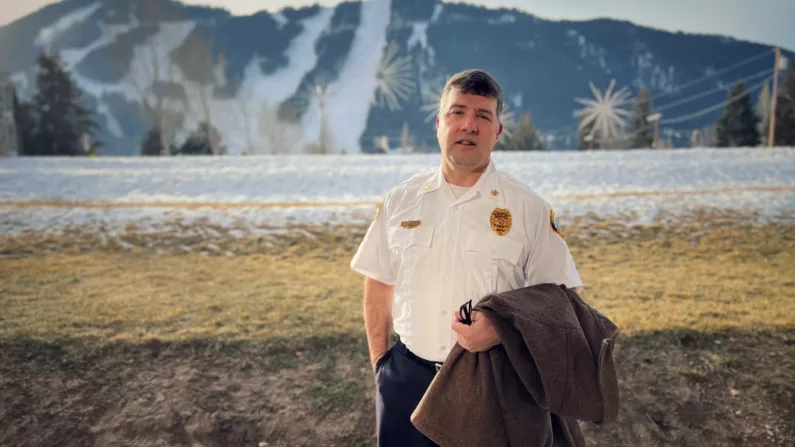The head of Jackson Hole Fire and EMS has been put on administrative leave.
Stephen Jellie took the reins as chief a little over a year ago. But in recent months, staff, volunteers and community members have shown up en masse to several Teton County Board of Commissioners meetings to call for his resignation, citing department cuts and some calling his management style demeaning and threatening.
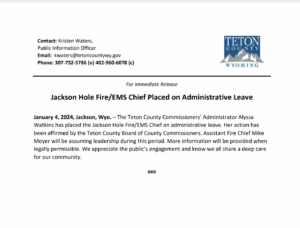
A notice from Teton County was sent out Thursday evening announcing Jackson Hole Fire/EMS Chief Stephen Jellie was placed on administrative leave. (Screenshot)
“Stephen Jellie has brought a new view and a very experienced financial background to the department,” said Bernhard Sieber, a fire volunteer in Hoback, at a December meeting. “Stephen Jellie has also brought erosion of trust, and degradation of moral and safety concerns including mental health throughout the department.”
“An unqualified, inexperienced and tyrannical chief is heading us toward a catastrophe,” said Jack Krill, another Hoback volunteer firefighter. “A change is needed to provide for the safety of the firefighters and the public.”
In a press release Thursday evening, County Administrator Alyssa Watkins said her move to put Jellie on administrative leave was affirmed by the Board of County Commissioners.
Assistant Fire Chief Mike Moyer will temporarily assume leadership, and Watkins said more information will be provided when “legally permissible.”
Jellie couldn’t be reached for comment after Thursday evening’s announcement.
But, earlier this week, Jellie reached out to KHOL to share what he called the “real side of the story.” Thursday morning — prior to being put on leave — Jellie spoke to KHOL about his time as leader of the county’s fire and EMS department, saying he had a fiscal responsibility to taxpayers to cut costs, citing budget deficits.
Jellie said he has also been tasked with reducing safety concerns in the department and pointed to a 172-page report from a consulting firm from a couple years back, which cited an “absence of accountability across the department,” a “lack of strategic planning,” and “safety and health concerns.”
“Unfortunately in my first year here, and not uncharacteristic of whenever a chief from outside of an organization like this gets brought in, you uncover and identify things that have been problems —- problems for a long time perhaps,” Jellie said in the KHOL studios.
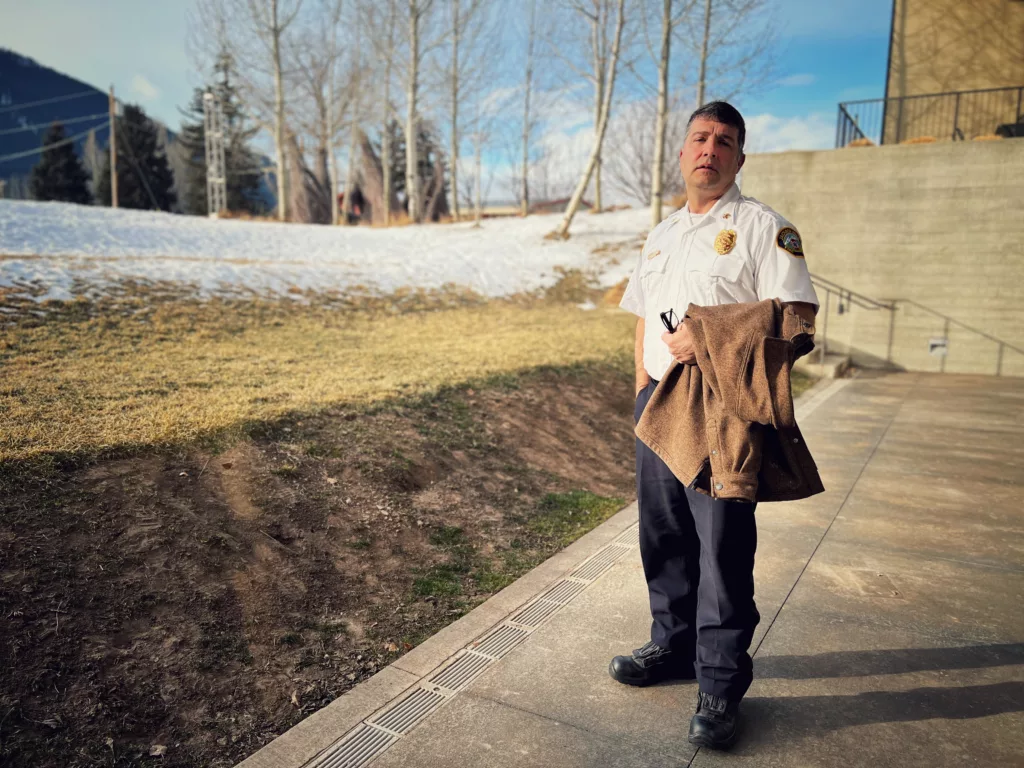
In an interview with KHOL — hours before being placed on administrative leave — Jackson Hole Fire/EMS Chief Stephen Jellie discusses public statements from staff and volunteers saying his management style was endangering lives. “I’m no longer going to tolerate people saying that I’m putting people’s lives in jeopardy or people are unsafe,’ or ‘the community is unsafe,'” Jellie says. “That is categorically false.” (Tyler Pratt/KHOL News)
Below is an edited version of his conversation with KHOL’s Tyler Pratt. They began with Jellie responding to quotes from staff that he is “fiscally intelligent.”
STEPHEN JELLIE: I am a student of the fiscal process. Our situation in Teton County, from a financial perspective, yes, there’s lots of money floating around here. But nobody here, not even the most wealthy, but certainly not the people who have lived here for three or four generations, desire to pay one more dollar of tax. So, I think it’s incumbent upon a department head like myself, whose organization right now is consuming between $10 and $11 million on an annual basis — it is important for the taxpayers to understand that I’m doing everything I can do to keep that cost as efficient as possible, so we’re not adding to what is going to be a growing cost of conducting local government business.
TYLER PRATT/KHOL: You’ve been at this role for a little more than a year now, and staff have been speaking out publicly to Teton County top officials asking for your removal and saying that you have ‘eroded trust in the department.’ What’s been going on?
JELLIE: It’s really unfortunate. You have to be able to lead your team effectively and there has to be a high level of trust and confidence. And unfortunately, in my first year here on — and not uncharacteristic of whenever a chief from the outside of an organization like this gets brought in — you uncover and identify things that have been problems, problems for for a long time, perhaps.
We had a 172-page report done by a highly competent consulting firm, issued about a year before my arrival, that detailed 115 recommendations for improvement, some of which were characterized as leading us on the path to a line-of-duty death. They’re very serious things in this report, that we sort of subtitled the ‘Gannon Report.’ There are a lot of things that need to be addressed from an immediate safety perspective. From my point of view, when I got here, my budget had a significant shortfall. We were trending close to $1 million over our current budget year. So, yeah, it put me in a sort of an immediate reaction mode. Not a lot of time to maneuver, not a lot of time to coordinate, collaborate and certainly communicate to the degree that I think some people would have liked. I think that’s what’s caused a level of, “Hey, what’s he going to do next?’
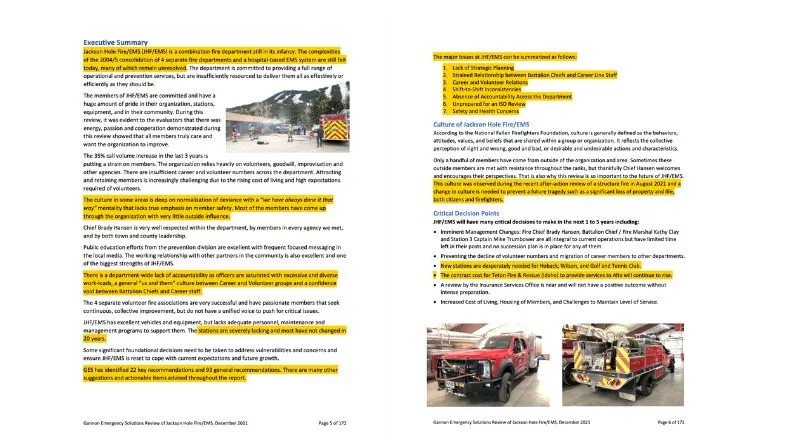
Pages from the so-called ‘Gannon Report,’ that Jellie sent to county commissioners this week. It’s a 172-page report from a consulting firm from a couple years back, which cited an “absence of accountability across the department,” a “lack of strategic planning,” and “safety and health concerns.” (Screenshot)
I’m not really here to reduce the size of the organization. I’m not here to change anybody’s career path. But if we don’t ensure that the organization is fiscally viable going forward, decisions will end up being made that will be significantly impacting. Whether that is a reduction in the size of the fire department or it’s a drastic increase in the amount of money the county has to put into the fire department, which again, could couple to that – raising taxes. So I’m trying to balance the needs of the community.
Response is number one. Safety of my personnel is the cornerstone of every decision I make now. But I’m clear about it: we don’t do anything without money. And I can’t afford another year, where my budget trends in the negative. And I can’t afford a year where the commissioners perhaps don’t have the money, and we have to put off buying fire trucks or we have to put off large capital improvements, because we’ve put ourselves in a financial crisis. I’m hoping the organization will recognize there were a lot of challenges in my first year, difficult decisions. And in my second year, I hope people will see that I’m much more conducive, open minded to ensuring that the organization has what the people want it to be.
KHOL: What do you say to your employees that now, for a third time, have got out publicly saying you have restricted them from being able to protect this community, calling your communication ‘dysfunctional?’
JELLIE: First, I’m sorry that anybody feels that way. I have heard the criticism and the feedback loud and clear. And I’m going to do everything I can do, including working with industry level professionals on how to ensure that I am communicating in a manner this is diverse enough, that reaches everybody in an appropriate manner. And in a group of employees that’s as big as Jackson Hole Fire and EMS, about 112 to 116 at any point, there are a lot of different personalities. I need to expand my communication mechanisms and methods.
But I absolutely reject and tell people, ‘I’m no longer going to tolerate people saying that I’m putting people’s lives in jeopardy or people are unsafe,’ or ‘the community is unsafe.’ That is categorically false. People should stop saying those things. You are not doing the organization, yourselves or the community any favors, when you inject fear into the community and anxiety because people think that they are not safe.
This organization had a critical level of five staff on duty per day when I got here. I have raised that to seven and have plans to raise it to eight. I have done nothing but increase our emergency response capability, make it stronger, make it more viable. I’m just not necessarily doing it in the manner that some people would like it. And while I am open to everyone’s opinions, at the end of the day, I am solely responsible for everybody in this organization, 24/7, 365. The buck stops with me. I accept my responsibility. I take it very seriously and people should stop talking about the community being [made] unsafe.
KHOL: You’ve been publicly called ‘threatening,’ ‘demeaning,’ and ‘‘tyrannical.’ Do you see yourself this way?
JELLIE: No. But I see myself after a career of working for the U.S. military as very direct. I don’t parse words. If you ask me for an answer, I give it to you. I don’t labor long on decisions. I think my personality couldn’t be more opposite than the previous chief. I don’t think you could find two people more opposite than Steve Jellie and Brady Hansen. However, I think I’m a long way from tyrannical.
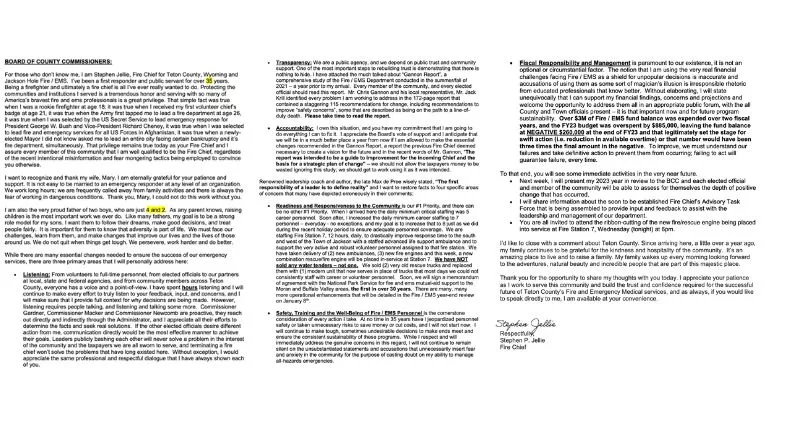
A letter Stephen Jellie wrote the Teton County Board of Commissioners on Jan. 3 following calls for his resignation from Jackson Hole Fire/EMS and community members. Last month, after staff spoke up at a public meeting, the board voted to have more oversight over Jellie’s leadership. (Screenshot)
I think that I have reprimanded people. That is just part of being employed. That is part of being a supervisor or a manager. Employees get reprimanded at times. Interestingly enough, there’s one example out there that takes a 15-second clip of what was probably a 4-minute conversation where I absolutely lost my appropriate choice of words with two employees. And I certainly wish that had not been the case, but that’s the only example anyone has been able to demonstrate, other than just this sort of growing legend, that I am out there screaming, yelling, being tyrannical with people.
I think certainly enough people in this organization have worked with me, have been exposed to me, have been around me, who have really told stories, much to the contrary of that. These are just unproductive conversations that are going on. And quite frankly, in my opinion, wasting time instead of getting to the heart of: what is it people don’t like? How can I address that better? And either convince you that what we’re doing is the way to do it, or at least convince you that I have heard you from a 360-degree perspective.
KHOL: How will you mend this heavily fractured relationship with the fire and EMS staff and department of volunteers?
JELLIE: I think we will communicate more. I don’t believe the relationship is anywhere near as fractured as some members of the public or some people would like to characterize it as. On a daily basis, every one of the fire and EMS staff come to work, act as professionals. We interact every day. I don’t have any concern with my relationship with people.
It will be important to understand: how can we better open up dialogue? How can people know they were heard and know that their feedback and their input was taken seriously?
But there also has to be a reckoning of understanding that at some point in time, the senior management staff calls the play. And when the play is called, everyone’s got to get back to work and do their job. And you cannot label every time you don’t like something ‘a safety issue.’ You can’t say ‘the world is coming to an end, the public is in jeopardy.’ That your life is in danger because you don’t like it.
[Discussing staffing] “I will categorically agree that three people is better than two and four is better than three. But I’ll also say, ‘one person is better than none and two is better than one.’ So this continued argument about the number of people, really from my perspective, is one that we just should recognize: these are the resources we have.
We have to do the absolute best we can until we convince the commission that we need additional resources. And I’m just not there right now. I feel like we have plenty of resources to do the job, until I’m here for a much greater period of time.
While I believe that it is appropriate for me to go ask the commission for significantly more money, 10 to $11 million is an enormous amount of money going into one program. And I think if people compare the cost of fire and EMS with every other department in the county, you’ll see what I’m talking about.
And as I’ve just recently laid out in a very exhaustive budget brief, our budget has doubled in five years. From about $5.5 million to $11 [million] we’re on track for. And if we keep spending at the rate we’re spending, we’re on track to double again in five or six years, $20 million. Does anybody really believe that is sustainable?

